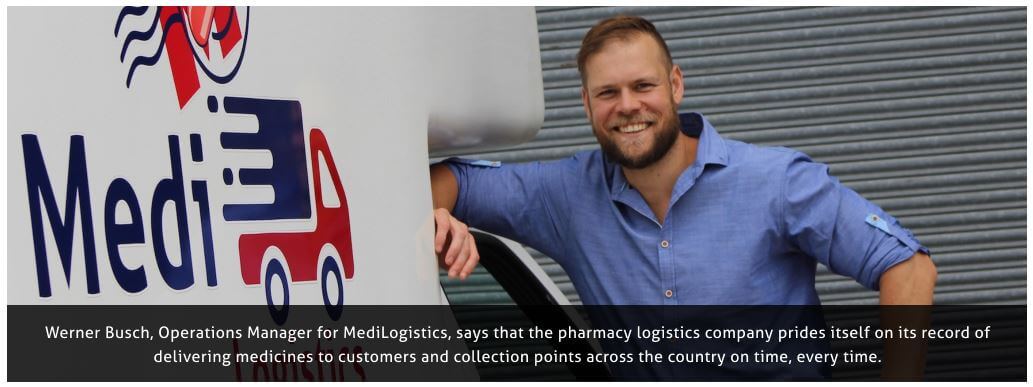Where logistics and pharmacy requirements meet

Transporting medcines safely and reliably to serve South Africa's needs
Wednesday, 29 May 2019, Medicines, chronic medicines in particular, are a lifeline for a significant proportion of
the South African population. However, the efficacy of certain medicines is reliant on the conditions under which
they are kept until they reach the patient. It is therefore of primary importance that medicine safety requirements
are carefully adhered to at every stage throughout the distribution chain.
“MediLogistics, the in-house courier service for Medipost Pharmacy, was born out of the Medipost Holdings group
in 2012 to provide end-to-end control over the courier pharmacy business to ensure compliance with specified
storage conditions for various types of medicines,” says Werner Busch, a qualified pharmacist and national
operations manager for MediLogistics.
“During the first month of operating, MediLogistics delivered some 3 000 parcels of medicine, and this has now
grown to approximately half a million parcels per month. We have since expanded our courier service to a number
of external wholesalers, as well as serving a network of 2 237 medicine collection points.”
Busch explains that while there is no requirement at present for courier services handling medicines to be
registered with regulatory authorities, however MediLogistics is already following the principles of Good Pharmacy
Practice when delivering medicines.
“Given the fact that MediLogistics was founded with the intention of developing a specialised medicine delivery
platform, we have been mindful of the appropriate precautions and have implemented these from the outset. We
are proud to be one of the few pharmacy courier companies that adheres to best practice, ensuring our clients can
rely on a truly professional service.”
Medilogistics currently operates 19 different branches throughout South Africa. These are located at Gezina and
Randfontein in Gauteng, Cape Town and George in the Western Cape, Bloemfontein and Welkom in the Free State,
Pietermaritzburg, Durban, Newcastle, Ladysmith, Dundee, Ixopo, Vryheid, Pongola, Richards Bay and Port
Shepstone in KwaZulu-Natal, Mahikeng in the North West, and East London in the Eastern Cape.
“From these distribution points, we deliver authorised medicines safely and reliably via our 200-strong fleet of
vehicles. Our temperature-controlled warehouses and insulated vehicles are able to handle delivery of both
ambient and cold chain items within the specified temperature and humidity range.”
Busch says that medicines requiring cold chain management are packaged in frozen packs suited to the specific
delivery route, with deliveries to some of the more remote areas packaged in such a way that temperature control
can be maintained for up to 72 hours.
“In terms of our Service Level Agreement on Cape Medical Depot (CMD) delivery routes, sensory probes monitor
the temperature of parcels so that any deviation from the ideal range can be identified early, and either rectified
before it can potentially impact the medicines or the item is replaced.
A dedicated team of 30 MediLogistics representatives work with doctors’ practices to provide a service whereby
patients can conveniently access their chronic medications through medicine collection points at a network of
doctors’ practices.
“Through this service, we work with doctors’ rooms in terms of a service level agreement. Doctors’ practises are
validated to ensure they have suitable facilities for the safe storage of the medicine parcels, including appropriate
refrigeration capacity for example, and we assist in training administrative staff in the use of the system so that we
can track whether each parcel has been dispensed to the patient it is intended for,” Busch explains.
Particularly in more rural areas, the doctors’ practice collection points are regarded as an important service in
assisting to drive chronic medication compliance, as patients can conveniently collect their prescription medicines
from their doctor’s premises. Strict confidentiality measures, including the fact that there is no indication of the
parcel contents on the external packaging, ensure that patient privacy is protected.
The patient-ready parcels that MediLogistics delivers to the doctors’ practice collection points are prepared by
Medipost Pharmacy, and Medipost Pharmacy engages directly with patients to notify them when to collect their
new parcels of chronic medicine, as well as reminding both patient and doctor when the prescription needs to be
renewed.
If the patient does not collect their parcel by a certain date, the patient is contacted in an effort to further
encourage compliance with their prescribed chronic medicines, which assists to drive better clinical outcomes.
MediLogistics employs a similar model for community collection points at community centres, schools and clinics,
as well as Department of Health Pick Up Points in KwaZulu-Natal.
“As a qualified pharmacist, I know the importance of the service MediLogistics provides in ensuring that medicines
arrive at their destination in optimal condition, and the vital role that MediLogistics’ medicine collection points
play in assisting patients to adhere to treatment of chronic health conditions through the convenience and
reliability of medicine supply.
“The meeting of pharmacy and logistics expertise, as embodied in the MediLogistics service offering, provides
peace of mind for healthcare professionals and patients alike,” Busch concludes.
Issued by: Martina Nicholson Associates (MNA) on behalf of MediLogistics
Contact: Martina Nicholson, Graeme Swinney, Meggan Saville and Estene Lotriet-Vorster Telephone: (011) 469 3016